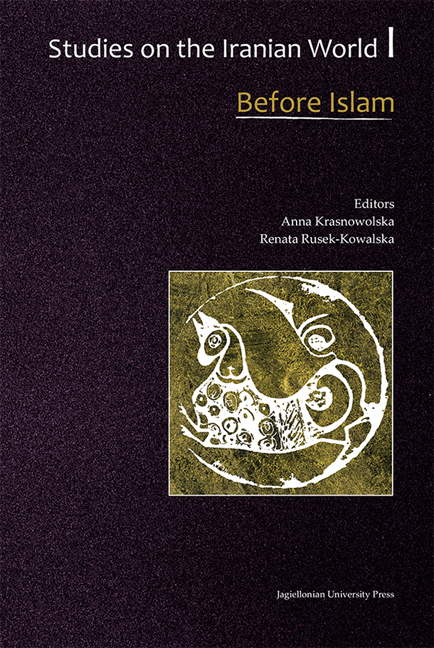Book contents
- Frontmatter
- Contents
- Foreword
- Linguistics
- Literature
- Religion
- Aspects of Hymnology in the Manichaean Community in Turfan
- Arǝdvī Sūrā Anāhitā: Considerations on the Greek ἀρχἡ
- Ohrmazd's Plan for Creation according to Book Three of the Denkard
- The Pahlavi Translation of Yašt 3
- On the Old Iranian Social Space and Its Relation to the Time Ordering System
- History
- Archaeology
Ohrmazd's Plan for Creation according to Book Three of the Denkard
from Religion
Published online by Cambridge University Press: 12 January 2018
- Frontmatter
- Contents
- Foreword
- Linguistics
- Literature
- Religion
- Aspects of Hymnology in the Manichaean Community in Turfan
- Arǝdvī Sūrā Anāhitā: Considerations on the Greek ἀρχἡ
- Ohrmazd's Plan for Creation according to Book Three of the Denkard
- The Pahlavi Translation of Yašt 3
- On the Old Iranian Social Space and Its Relation to the Time Ordering System
- History
- Archaeology
Summary
SUMMARY
In this paper I will discuss the structure of Book Three of the Denkard and will propose that it is divided into three sections. The first and longest section describes and defines concepts according to the rules of logic (from §1 to §195; B 832–670). The second section relates these concepts to the life of man in the material world and gives advice as to how a man should live to lead a virtuous life (§196–§286; B 670–607). The third section aims at providing a deeper understanding of the concepts discussed in the first and second sections (§287–§410; B 606–516). I will illustrate this by following two key terms in the worldview of the learned priests, handāzišn and xwarrah, in their specialized meanings of ‘impellent, determined goal’ and ‘inherent individual fortune’ as they are developed throughout the work.
INTRODUCTION
The third book of the Denkard (henceforth Dk 3) has been identified as a book of apologetics designed to defend the Zoroastrian faith against other religions but it is even more a compendium of beliefs combined with advice on how to lead a good life in this world so as to save one's soul and defeat evil. In it late Hellenistic logic and philosophy are used as tools in debate with other religions but at the same time many of the concepts were adopted to clarify notions which were implicit but not clearly stated in the revealed texts, i.e. the Avesta and Zand.
Even though none of the earliest translations and adaptations of works on logic or philosophical treatises translated into Middle Persian (henceforth MP) have survived, it is clear that this activity must have taken place during the same period as works of Greek philosophy were being translated into Syriac in the late 6th century. Much of this work in MP was sponsored by the Sasanian king Xosrow Anoshirvan (531–579) and by the time of the oldest parts of Dk 3, which are possibly from the 8th century, the material had been integrated into Zoroastrianism in a manner approved by the learned teachers.
- Type
- Chapter
- Information
- Studies on the Iranian World: Before IslamMedieval and Modern, pp. 153 - 162Publisher: Jagiellonian University PressPrint publication year: 2015



